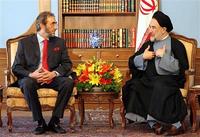
The Prime Minister of Iraq, Ibrahim Jaafari (who had been given asylum in Iran from 1980 through 1989 under Ayatollah Khomeini), along with a significant delegation of high-ranking Iraqi cabinet members, is making an official visit to Iran. According to the Iranian Charges D'Affaires in Iraq, the "expansion of ties is based on deep religious commonalties, extensive social and cultural exchanges, historical background, geographical conditions and the long common borderline between the two states." Jaafari is no stranger to the kind of fundamentalist government that rules Iran. He lived there, learned how they rule, and, basically, owes them his life. How much of an admirer is he of this form of Shiite dominated governance? Is he seeking to emulate it? Didn't they have elections in Iran? Isn't that democracy?
"Deep religious commonalities" is the key phrase here. Everything else follows from it: economic, social, cultural, political.
This meeting follows up a visit by the Iraqi Defense Minister only a few weeks ago. In the picture at left above, Iranian President, Mohammad Khatami, right, talks with Iraqi Defense Minister, Saadoun al-Duleimi, during their official meeting in Tehran on July 7, 2005 (Photo:Vahid Salemi/AP).
How is the American government reacting to all this dull roar going on in relations between Iraq (our ally, our surrogate, our newly formed democracy, our child of freedom) and a member of the Axis of Evil, Iran? We can only guess that they are tearing their hair out at the White House. And in Iraq, the Americans must be warning the Iraqis of all kinds of dire consequences. Bush must be apoplectic.
Tens of thousands of Iranians will be making visits to Shiite holy sites in Iraq, trade delegations will increase significantly, economic cooperation of all kinds will flourish.
By the time Bush leaves office, will one of his major foreign policy legacies be an Iranian/Iraqi alliance? Sure looks that way.
No comments:
Post a Comment